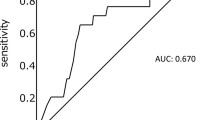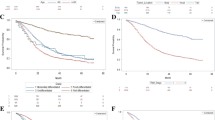Summary
Survival after pancreatic cancer surgery is extremely unfavorable even after curative resection. Prognostic factors have been explored but remain largely undefined. The present study was to identify the role of clinical and laboratory variables in the prognostic significance of resectable pancreatic adenocarcinoma. A total of 96 patients who underwent curative resection for pancreatic cancer were included. Survival was evaluated based on complete follow-up visits and was associated with potential prognostic factors using the Kaplan-Meier method and Cox proportional hazard model survival analyses. The results showed that prognostic variables significantly reduced survival, including old age, poorly differentiated tumors, elevated tumor markers and positive lymph node metastasis (LNM). Age of older than 60 years (HR=1.83, P=0.04), LNM (HR=2.22, P=0.01), lymph node ratio (0<LNR≤0.2, HR=1.38, P=0.042; LNR>0.2, HR=1.92, P=0.017), initial CA199 (HR=4.80, P=0.004), and CEA level (HR=2.59, P=0.019) were identified as independent prognostic factors by multivariate analysis. It was concluded that LNR may be potent predictor of survival and suggests that surgeons and the pathologists should thoroughly assess lymph nodes prior to surgery.
Similar content being viewed by others
References
Siegel R, Ma J, Zou Z, et al. Cancer statistics, 2014. CA Cancer J Clin, 2014,64(1):9–29
Rahib L, Smith BD, Aizenberg R, et al. Projecting cancer incidence and deaths to 2030: the unexpected burden of thyroid, liver, and pancreas cancers in the United States. Cancer Res, 2014,74(11):2913–2921
Sun H, Ma H, Hong G, et al. Survival improvement in patients with pancreatic cancer by decade: a period analysis of the SEER database, 1981-2010. Sci Rep, 2014,4:6747
Du L, DeFoe M, Ruzinova MB, et al. Perioperative therapy for surgically resectable pancreatic adenocarcinoma. Hematol Oncol Clin North Am, 2015,29(4):717–726
Wray CJ, Ahmad SA, Matthews JB, et al. Surgery for pancreatic cancer: recent controversies and current practice. Gastroenterology, 2005,128(6):1626–1641
Stojadinovic A, Brooks A, Hoos A, et al. An evidence-based approach to the surgical management of resectable pancreatic adenocarcinoma. J Am Coll Surg, 2003,196(6):954–964
Yamamoto Y, Ikoma H, Morimura R, et al. The clinical impact of the lymph node ratio as a prognostic factor after resection of pancreatic cancer. Anticancer research, 2014,34(5):2389–2394
Benassai G, Quarto G, Perrotta S, et al. Long-term survival after curative resection for pancreatic ductal adenocarcinoma-Surgical treatment. Int J Surg, 2015,21 Suppl 1:S1–3
Yamamoto T, Yagi S, Kinoshita H, et al. Long-term survival after resection of pancreatic cancer: a single-center retrospective analysis. World J Gastroenterol, 2015,21(1):262–268
Li D, Chen C, Zhou Y, et al. Gemcitabine Compared With Gemcitabine and S-1 Combination Therapy in Advanced Pancreatic Cancer: A Systematic Review and Meta-Analysis. Medicine, 2015,94(35):e1345
Schwarz RE, Smith DD. Extent of lymph node retrieval and pancreatic cancer survival: information from a large US population database. Ann Surg Oncol, 2006,13(9):1189–1200
Fujii T. Extended lymphadenectomy in pancreatic cancer is crucial. World J Surg, 2013,37(8):1778–1781
Marmor S, Burke EE, Portschy PR, et al. Lymph node evaluation for treatment of adenocarcinoma of the pancreas. Surg Oncol, 2015,24(3):284–291
Dasari BV, Pasquali S, Vohra RS, et al. Extended versus standard lymphadenectomy for pancreatic head cancer: Meta-analysis of randomized controlled trials. J Gastrointest Surg, 2015,19(9):1725–1732
Jang JY, Kang MJ, Heo JS, et al. A prospective randomized controlled study comparing outcomes of standard resection and extended resection, including dissection of the nerve plexus and various lymph nodes, in patients with pancreatic head cancer. Ann Surg, 2014,259(4):656–664
Pelucchi C, Galeone C, Polesel J, et al. Smoking and body mass index and survival in pancreatic cancer patients. Pancreas, 2014,43(1):47–52
Gaujoux S, Torres J, Olson S, et al. Impact of obesity and body fat distribution on survival after pancreaticoduodenectomy for pancreatic adenocarcinoma. Ann Surg Oncol, 2012,19(9):2908–2916.
Dandona M, Linehan D, Hawkins W, et al. Influence of obesity and other risk factors on survival outcomes in patients undergoing pancreaticoduodenectomy for pancreatic cancer. Pancreas, 2011,40(6):931–937
Tramacere I, Scotti L, Jenab M, et al. Alcohol drinking and pancreatic cancer risk: a meta-analysis of the dose-risk relation. Int J Cancer, 2010,126(6):1474–1486
Olson SH, Chou JF, Ludwig E, et al. Allergies, obesity, other risk factors and survival from pancreatic cancer. Int J Cancer, 2010,127(10):2412–2419
Park SM, Lim MK, Shin SA, et al. Impact of prediagnosis smoking, alcohol, obesity, and insulin resistance on survival in male cancer patients: National Health Insurance Corporation Study. J Clin Oncol, 2006,24(31):5017–5024
Miura JT, Krepline AN, George B, et al. Use of neoadjuvant therapy in patients 75 years of age and older with pancreatic cancer. Surgery, 2015,158(6):1545–1555
Bolm L, Janssen S, Kasmann L, et al. Predicting survival after irradiation of metastases from pancreatic cancer. Anticancer Res, 2015,35(7):4105–4108
Yang X, Hao J, Zhu CH, et al. Survival benefits of western and traditional Chinese Medicine treatment for patients with pancreatic cancer. Medicine, 2015,94(26):e1008
Tanaka T, Ikeda M, Okusaka T, et al. Prognostic factors in Japanese patients with advanced pancreatic cancer treated with single-agent gemcitabine as first-line therapy. Jpn J Clin Oncol, 2008,38(11):755–761
Bilimoria KY, Bentrem DJ, Ko CY, et al. Validation of the 6th edition AJCC Pancreatic Cancer Staging System: report from the National Cancer Database. Cancer, 2007,110(4):738–744
Fischer LK, Katz MH, Lee SM, et al. The number and ratio of positive lymph nodes affect pancreatic cancer patient survival after neoadjuvant therapy and pancreaticoduodenectomy. Histopathology, 2016,68(2):210–220
Zhou D, Ye M, Bai Y, et al. Prognostic value of lymph node ratio in survival of patients with locally advanced rectal cancer. Can J Surg, 2015,58(4):237–244
Zhao BW, Chen YM, Jiang SS, et al. Lymph node metastasis, a unique independent prognostic factor in early gastric cancer. PLoS One, 2015,10(7):e0129531
Yoo T, Lee WJ, Woo SM, et al. Pretreatment carbohydrate antigen 19-9 level indicates tumor response, early distant metastasis, overall survival, and therapeutic selection in localized and unresectable pancreatic cancer. Int J Radiat Oncol Biol Phys, 2011,81(4):e623–630
Chen Y, Gao SG, Chen JM, et al. Serum CA242, CA199, CA125, CEA, and TSGF are biomarkers for the efficacy and prognosis of cryoablation in pancreatic cancer patients. Cell Biochem Biophys, 2015,71(3):1287–1291
O’Brien DP, Sandanayake NS, Jenkinson C, et al. Serum CA19-9 is significantly upregulated up to 2 years before diagnosis with pancreatic cancer: implications for early disease detection. Clin Cancer Res, 2015,21(3):622–631
Tas F, Karabulut S, Ciftci R, et al. Serum levels of LDH, CEA, and CA19-9 have prognostic roles on survival in patients with metastatic pancreatic cancer receiving gemcitabine-based chemotherapy. Cancer Chemother Pharmacol, 2014,73(6):1163–1171
Lagergren J, Mattsson F, Zylstra J, et al. Extent of lymphadenectomy and prognosis after esophageal cancer surgery. JAMA Surg, 2016,151(1):32–39
Nimura Y, Nagino M, Takao S, et al. Standard versus extended lymphadenectomy in radical pancreatoduodenectomy for ductal adenocarcinoma of the head of the pancreas: long-term results of a Japanese multicenter randomized controlled trial. J Hepatobiliary Pancreat Sci, 2012,19(3):230–241
Chiang KC, Yeh CN, Ueng SH, et al. Clinicodemographic aspect of resectable pancreatic cancer and prognostic factors for resectable cancer. World J Surg Oncol, 2012,10:77
Uson Junior PL, Franca MS, Rodrigues HV, et al. Higher overall survival in metastatic pancreatic cancer: the impact of where and how treatment is delivered. Einstein (Sao Paulo), 2015,13(3):347–351
Yoon KW, Heo JS, Choi DW, et al. Factors affecting long-term survival after surgical resection of pancreatic ductal adenocarcinoma. J Korean Surg Soc, 2011,81(6):394–401
Lee SR, Kim HO, Son BH, et al. Prognostic factors associated with long-term survival and recurrence in pancreatic adenocarcinoma. Hepatogastroenterology, 2013,60(122):358–362
Engelken FJ, Bettschart V, Rahman MQ, et al. Prognostic factors in the palliation of pancreatic cancer. Eur J Surg Oncol, 2003,29(4):368–373
Krishnan S, Rana V, Janjan NA, et al. Prognostic factors in patients with unresectable locally advanced pancreatic adenocarcinoma treated with chemoradiation. Cancer, 2006,107(11):2589–2596
Acknowledgments
The authors thank Professor Xiu NIE and Qin ZHANG in Department of Pathology, Union Hospital, Tongji Medical College for providing pathological data and valuable suggestions.
Author information
Authors and Affiliations
Corresponding author
Additional information
This study was supported in part by the National Natural Science Foundation of China (No. 81470039, No. 81330014, and No. 81272656).
Rights and permissions
About this article
Cite this article
Lin, R., Han, Cq., Wang, Wj. et al. Analysis on survival and prognostic factors in patients with resectable pancreatic adenocarcinoma. J. Huazhong Univ. Sci. Technol. [Med. Sci.] 37, 612–620 (2017). https://doi.org/10.1007/s11596-017-1780-2
Received:
Revised:
Published:
Issue Date:
DOI: https://doi.org/10.1007/s11596-017-1780-2




